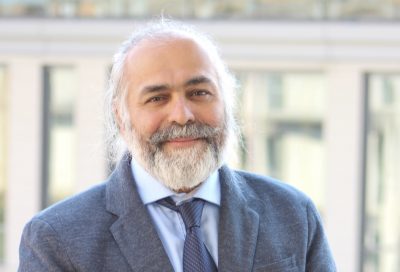UT Scientists Use AI to Forecast Weather at Paris Olympics
July 29, 2024

The 2024 Paris Olympics are in full swing. While the world’s eyes are on the athletes, event organizers are keeping a close watch on something else: the weather.
A University of Texas at Austin research team led by Professor Dev Niyogi and distinguished postdoctoral fellow Manmeet Singh, is assisting on that front by using AI tools to provide a daily forecast of weather conditions in Paris.
The forecast includes the usual rain chance, wind speed, temperature and humidity, as well as a more novel measure called “thermal comfort” – an indicator of how hot on-the-ground conditions actually feel after the surrounding shade of buildings and trees are taken into account.
“We can all contribute in our own ways at these events,” said Niyogi, who is a professor at the UT Jackson School of Geosciences and the Cockrell School of Engineering. “I’ll never be an athlete at the Olympic level, but to the best of my ability, I feel this is the way I compete in the spirit of the Olympics.”
The daily UT forecast is one of about a half dozen weather forecasts sent to Olympic officials through a project supported by the World Meteorological Organization (WMO). The project includes a range of international research organizations – including the national weather services of the United States, the United Kingdom, Germany and Sweden – each with their own forecasting approach and focus.
These forecasts are provided as a supplement to the regular forecast provided by Météo-France, the official French meteorological association. Although most of the research forecasts are just for research and Olympic officials, portions of the daily UT forecasts are publicly available online for education and outreach purpose.
The supplemental research forecasts are useful for Olympic officials, according to Niyogi, because they can help them fine-tune event scheduling and logistics for the largest sporting event in the world.
These forecasts are tuned to focus on conditions at the “city scale” and incorporate specific on-the-ground data about conditions from Paris and the coastal areas of the city of Marseilles, where some Olympic events are taking place. This scale is much finer than the methods used in conventional weather forecasting, Niyogi said. That means the research forecasts may pick up on conditions that would otherwise go unnoticed.

“We don’t represent cities very well within most weather models,” Niyogi said. “So there has been a concerted effort where different research teams have been trying to study measurements over cities and trying to present those features into weather models to improve forecasting into cities.”
Niyogi added that he and members of his lab are learning how to improve such forecasts by testing their models over cities like Austin, which can help with forecasting extreme weather events for Austin and other cities.
The UT forecast works by taking weather from big global models that provide data at the relatively coarse scale of about 25-by-25 kilometers and “downscaling” the data using machine learning to a much finer resolution of 1 kilometer or finer – what Niyogi calls the “neighborhood scale”.
“The data from the global models is useful but we cannot directly use it, so it’s useful but not usable,” said Harsh Kamath, a doctoral student working with Niyogi on the daily forecast. “You can think about it like a grainy picture; we make it finer. So we capture more details for the cities.”
The feat requires significant computing power, which is carried out by high-performance computing systems at UT’s Texas Advanced Computing Center.
Daily weather forecasting is not a regular activity for the Niyogi’s lab. The Olympic forecasting is a chance to apply his lab’s machine learning approaches to a new purpose and potentially help advance research in weather forecasting at city scales while helping Olympic athletes – 30 of which are from UT – stay weather aware.
“The fact that this research is being done in the context of the Olympics, and the fact that it’s possible that some of these results may be used to help such an event is emblematic of the UT spirit – ‘what starts here changes the world’,” Niyogi said.
There’s only one way to know how well the forecasts perform: let the games begin!
For more information, contact: Anton Caputo, Jackson School of Geosciences, 512-232-9623; Constantino Panagopulos, University of Texas Institute for Geophysics. Monica Kortsha, Jackson School of Geosciences, 512-471-2241.
